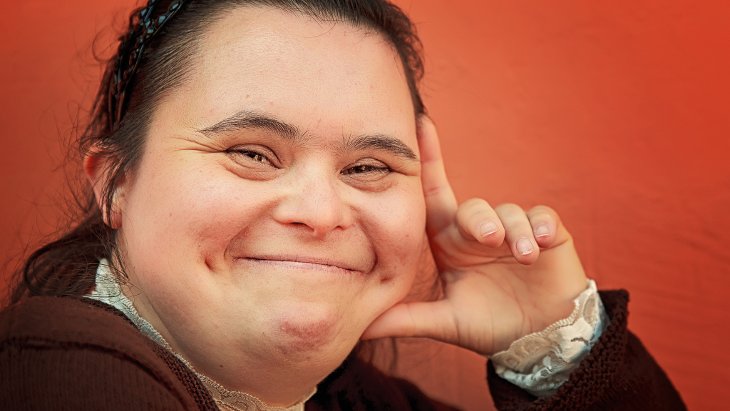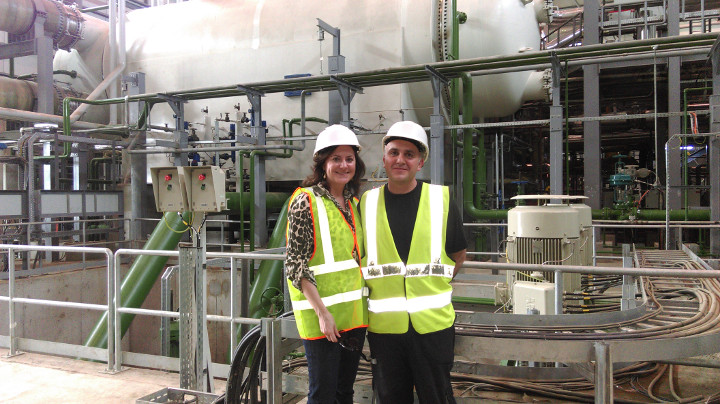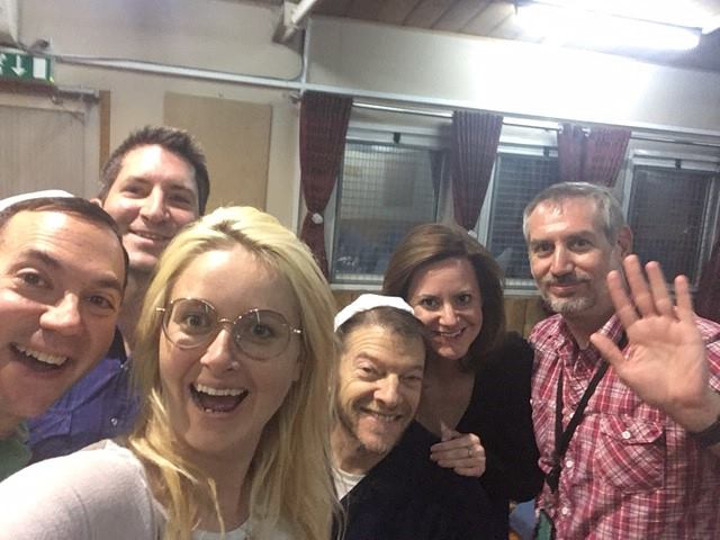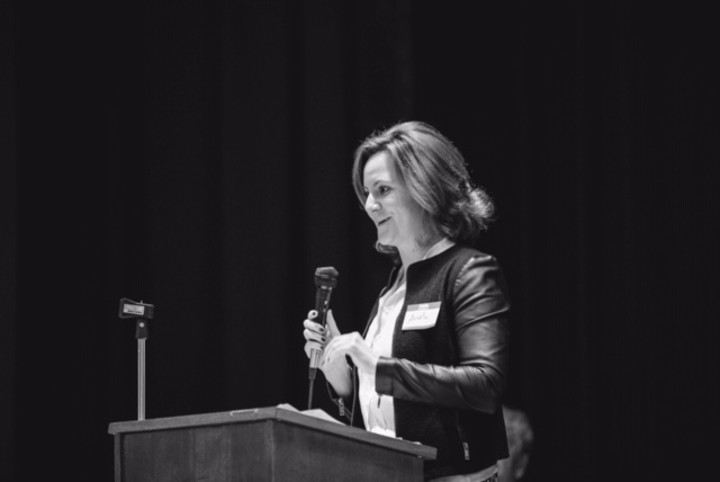 Iran’s Attack on Israel
Iran’s Attack on Israel


11 min read
Does a true unselfish act really exist?
That Thursday morning, I arrived at the office by 7:30 am and welcomed the pre-chilled air that greeted me. It was an unusually hot September and I had no desire to be caught in a sweltering taxi in morning traffic. The past week, road rage had overtaken Tbilisi with irritated, hot and impatient Georgians side-swiping and rear-ending each other at almost every intersection. No side mirror was safe.
In the middle of my morning multi-tasking routine (first one into the office makes coffee) Joel called as if directed by telepathy. Joel, an acquaintance turned friend, and I were coordinating healthcare and social services for a Jewish Georgian girl named Miriam. Born with Down’s Syndrome and a hole in her heart, Miriam would have stood a fighting chance at a good life in a Western country. Born into poverty in rural Georgia to parents who were not equipped to take care of her, Miriam was up the proverbial creek without a paddle. Joel and I were her paddle and normally spoke once a day – we ruefully called it our “co-parenting” touch base.
Normally loquacious, Joel was distraught and I could barely understand him. Finally, amidst somewhat incoherent ramblings and crying, his message came through loud and clear: Miriam had passed away in the night. The news knocked the wind out of me – I squeezed my eyes shut and focused on regular breathing. But Joel’s next stream of consciousness left me speechless. “Joel,” I croaked out, “could you say that again?”
“We’re driving her down to the Azerbaijani border for a Jewish burial. How soon can you be there?”
“I found a kittel and a van,” Joel said, “and we’re driving her down to the Azerbaijani border for a Jewish burial! How soon can you be there?”
“Joel,” I started slowly, “didn’t the hospital want to keep her overnight? I mean, what about disease, contamination… she had a very bad infection…Joel, it’s 90 degrees out! Is the van refrigerated?! Wait, where did you get the van? You don’t own a van.” Not a conversation I ever thought I would be a party to.
 The author at a thermal energy plant, Republic of Georgia
The author at a thermal energy plant, Republic of Georgia
Joel came back with characteristic bravado. “I found a Rabbi – he’s following behind me. The head of the municipality is meeting me with grave diggers. When can you be there? We will wait for you!”
Leaving Tbilisi at 12 PM, I could be at the Azerbaijani border within five hours, four if a Georgian drove me. “I’ll be there by 5 PM,” I told Joel and hung up. Feeling numb all over, I walked next door and knocked on my boss’ door. “Manfred…I have a funeral to go to…”
Miriam and I met the previous March. She was a sassy, beautiful, and cheeky 13 year old and I loved her on sight. A friend had recommended Miriam and I meet; I missed my younger sister terribly and wanted to feel that I was doing something to fill the massive need in Georgia. The heavens answered. In the beginning, I saw my sister in Miriam, but Miriam’s personality and strong-will quickly asserted themselves and I discovered that she was no one’s stand-in, replacement or charity case. Despite, or maybe in spite, of being grievously ill and poverty stricken, Miriam’s essence shouted to anyone within range: “I am here, I am still standing, and I do not care what you all think!” How could you not love such a soul?
Now, Miriam was suffering early stages of congestive heart failure and surgery could save her life.
Technically, Miriam’s condition was operable, at least it had been four years before she and I met. Now she was suffering early stages of congestive heart failure and surgery could save her life. After gaining her friendship and the trust of her mother, I talked my way into getting Miriam an appointment with the top pediatric cardiovascular surgeon in Georgia. A charming, man in his early 60s, Dr. Giorgi had studied medicine twice – once in Moscow and once at UCLA, on a Fulbright. How he did the latter, I have no idea as he spoke no English. Tiko, his nurse, was an excellent interpreter and our go-between.
After giving Miriam a comprehensive examination, he would accept no payment. Tiko explained, “Ms. Ariela, this child was brought to him four years ago by a social worker and he immediately recommended surgery. No one listened and he feels he should have pushed harder at that time.”
Dr. Giorgi shook his head and said in Russian, “We will see. She is very sick. We will see. I will have all the tests results in three days.”
Three days later, we had the verdict: no surgery; Miriam’s body was wracked with astounding levels of infection. Not one to accept no for an answer, I took to negotiating with the good doctor. We struck a compromise: admit Miriam to the hospital for one month to be treated for her infection, under Dr. Giorgi’s care. If her infection receded, he would consider the life-saving surgery. It was a long shot but we threw all our energy into it: Tiko took care of all administrative matters; after much hand wringing, I convinced Miriam’s mother to admit Miriam; and Joel, who volunteered as part-time medic, drove the ambulance.
We had a month. I sprang into action and began organizing: a good apartment, medicine, food, clothes, bedding…well pretty much everything. Her family was destitute. Joel and I became a tag team duo and delegated. I fired the state-assigned social worker and found another one – it was a chutzpah-move pure and simple. The new social worker, Mariana, was a soft-spoken voice of calm reason and became a key liaison with Dr. Giorgi.
One key concern was to find funds to pay for Miriam’s future heart surgery. The hospital would absorb half the costs but that left quite a deficit. I turned to the Tbilisi expatriate community and approached a charity that distributed funds to needy families. Within 24 hours, the charity agreed to fund the second half of Miriam’s surgery. The charity’s Board Chair sent me a personal message, “What else does the family need? I want to help.”
I almost cried and responded, “Everything. Clothes, bedding and money for food are top on the list.” The next day, the Board Chair delivered two bags of new clothes and bedding to my apartment.
Good will, kindness, and generosity gushed from everywhere.
When I gleefully told a friend about the Board Chair’s generosity, she recommended sending a general email to the expatriate Tbilisi community. “I am sure many people will want to help,” she stated. At 11 PM that night, I sent a shout-out email to the Tbilisi expatriate community requesting donations. By 5 PM the next day, I considered hiring a part-time assistant to handle the responses. Good will, kindness, and generosity gushed from everywhere: all I had to do was shine a light on someone desperately in need and people came running. My living room was soon filled with bags of children’s and women’s clothes (Miriam’s mom had not gone shopping in years), bedding, towels, dishes, pots and pans, toys, books – you name it. As a good friend and I sorted through the bags, my telephone rang: Joel had found a furnished apartment in a good area! Only down-side? No air conditioning. It was May and already averaging 85 degrees Fahrenheit by 11 AM. We needed fans and so another email was sent to the trusted Tbilisi expatriate community: anyone wanna get rid of fans? An hour later, a woman, who was to become a good friend, emailed, “Let’s go shopping.”
 Expatriate Jewish Community Gathering, RS NATO Chapel, Kabul, Afghanistan
Expatriate Jewish Community Gathering, RS NATO Chapel, Kabul, Afghanistan
I was in Batumi, Georgia when the social worker called. “Ariela…,” she started slowly and I knew the answer. No surgery – Miriam’s condition was too far gone, her body too fragile from years of infection and her heart wall too weakened. I argued, “But what if we gave her more time? More medicine? She looks so much better after only one month!”
Mariana murmured, “I am sorry, I tried with Dr. Giorgi. He is adamant. It is in God’s hands now. We need to focus on her end-of-life care.”
I thanked her, hung up and called Tiko. She echoed Mariana, “We are sorry, she is a very special child. We need to focus on her end-of-life care. ”
Was everyone listening to the same record?! The anger and deep desolation crept up, and I almost gave in. Instead I called my mom, who exclaimed, “Oh sweetie, I am so sorry!” That did it – tears of anger and sorrow poured out of me and did not stop for several hours.
But thank goodness was I angry; it propelled me forward, blocking out other emotions. Ignoring my desire to shout at the heavens, I reached out to the Tbilisi expatriate community. The charity that had committed hundreds of dollars for heart surgery immediately re-allocated the funds for medicine, food and other critical needs. Word got out about Miriam’s condition and donations came pouring in necessitating me to open a special separate checking account.
A good friend provided a needed wake-up call that dragged me out of my grief, and to be honest, self-pity. “Ariela, look at all the good you have done!” Karen yelled, tired of hearing me bemoaning my apparent inability to fight death. I sulked in response. Carolyn ignored me and continued, “Stop feeling sorry for yourself! You gave all these people, many whom were strangers, an incredible opportunity to selflessly help someone else! You brought goodness and light into a dark place. ”
Her words brought to mind a Talmudic teaching that caused me pause. The Talmud states that rewards for acts of true kindness, gemilut chasadim, will be given in this world, not the world to come.
 The author at a public reading, Chicago
The author at a public reading, Chicago
In one of my favorite interpretations of this Talmud, Emmanuel Levinas teaches that by responding to suffering with kindness and generosity, we bring God into the world. Taken a step further, if we create a communal response and engagement to taking care of the needy, we create a living space for holiness in our very midst. Growing up, kindness and generosity of spirit were drilled into me by family and community. During my two final years in high school, I served on the “Community Chesed Committee”, organizing food and clothing drives for young and low-income families. While my efforts were valuable, they contained a real layer of self-interest: social cache, recognition, looks great on college applications – interests to which we all are familiar. I often wondered about that elusive unicorn: a true unselfish act: did it really exist?
The realization that I had actively thrown myself, and rallied others, into an act of unselfish kindness was a thunderbolt.
The realization that I had actively thrown myself, and rallied others, into an act of unselfish kindness was a thunderbolt. We had all just done it – not because we felt compelled by any external construct but because we all knew it was the only option. All donations were anonymous, no names were ever mentioned, and there was no personal reward tied to anything.
The next several months were touch and go. Although Miriam officially came home in June, she was back in the hospital by mid-August with full-blown pneumonia. The “co-parenting” team had expanded to include Joel, her doctors, the social worker and I – and we all knew it was a matter of time. So Joel’s call in September did not come as a surprise.
A week before Rosh Hashanah and her 14th birthday, Miriam had a short, Jewish funeral and was buried in a tiny Jewish cemetery in the Lago Dekhi region of Georgia, along the Azerbaijani border. Joel had found the plot, most probably through Divine intervention, despite there being no active Jewish community in that region for years.
Miriam passed away peacefully in her sleep. It’s taken a while but I have accepted that a peaceful death is a blessing and miracle. Six months after her funeral, I gained a deeper understanding of the Talmudic teaching that reward for kindness is in this world. While traveling for work, my colleagues and I were in a bad car accident. It easily could have been much worse – the driver fell asleep and veered into the pathway of a 12-wheeler semi-truck. The truck driver’s blaring horn woke our driver in enough time to steer out of the way so that no passengers were injured. Our van took quite a beating but thank God all passengers walked away with only minor scratches.
After exiting the crushed vehicle, I realized that we were within two miles of Miriam's grave. The Talmud’s teaching hit me square in the face, and I began shaking in gratitude for the enormity of the miracle given to us for an act of unselfish kindness. From that moment forward, I have believed in guardian angels, miracles, and the immense value and impact of doing unselfish acts of kindness.
